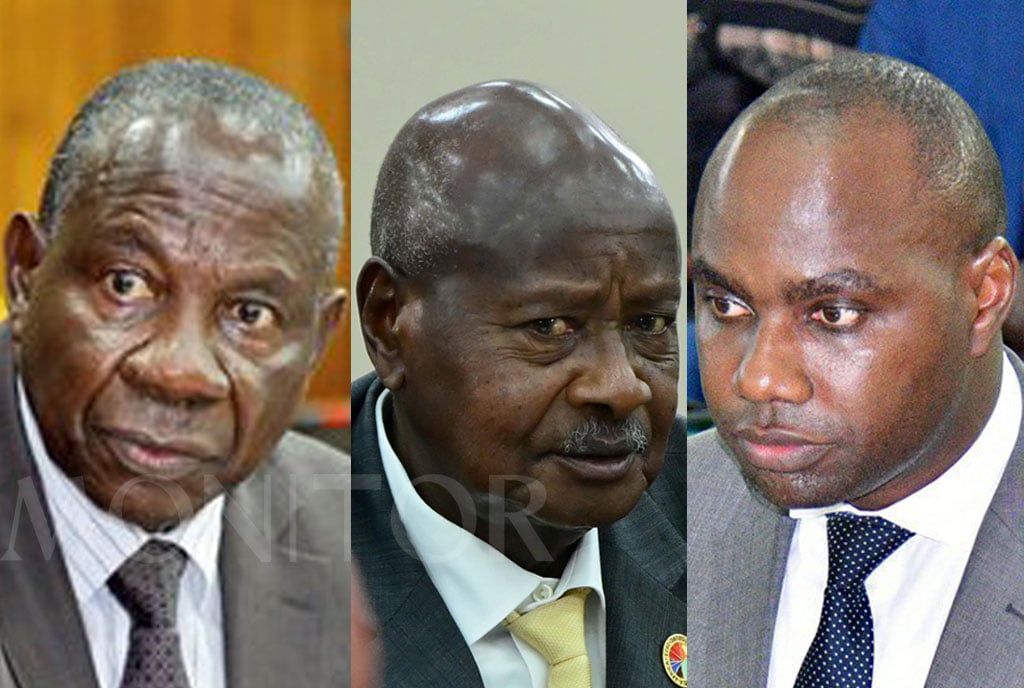Supplementary budgets are wasteful, undermine planning –Auditor General

Auditor General John Muwanga hands over his 2022/2023 annual report on how taxpayers’ money was spent to Speaker Anita Among at Parliament on January 9, 2023. PHOTO/DAVID LUBOWA
What you need to know:
- Total supplementary expenditure by the central government increased from Shs1.682 trillion in the Financial year 2017/2018 to Shs4.27 trillion in the Financial year 2021/2022
The Auditor General, John Muwanga has underscored the wastefulness and inappropriateness of supplementary budgets in his latest audit report for financial year 2022/2023.
In the report handed over to the speaker of Parliament on January 9, the Auditor General reveals failure to utilize Shs5.822 trillion, part of which, Shs4.416 trillion Shillings was appropriated through a supplementary budget.
During the financial year under review, Parliament appropriated an initial national budget of Shs48.132 trillion Shillings.
This budget was later revised to Shs52.548 trillion through supplementary budgets totaling Shs4.416 trillion, to finance government expenditure.
“I noted that whereas the revenue budget was revised to Shs48.136 trillion, the expenditure budget was revised to a total of Shs52.548 trillion in the course of the year, leading to an unbalanced budget by Shs4.412 trillion,” says Edward Akol, the Assistant Auditor General in charge of Audit.
He further explains that only Shs43.404 trillion budget was spent against warrants of Shs49.226 trillion, indicating unutilized funds totaling Shs5.822 trillion.
“Overall, since the initial budget was Shs48.132 trillion and actual expenditure only amounted to Shs43.404 trillion, this implies that there was no need for a supplementary budget since the original resource envelope was not fully realized,” reads the audit report.
The Auditor General further notes that this budget performance implies that the supplementary budget was approved without fully identifying new funding sources and that consequently, the supplementary warrants were funded using resources meant for Ministries, Departments and Agencies (MDAs) and Local Governments leading to budget shortfalls in some votes.
“Failure to fully fund the revised budget and underutilization of warrants affected implementation of planned activities. I advised government to address all implementation bottlenecks that continue to impede Accounting Officers from utilizing availed warrants,” further reads the audit report.
The Auditor General also advised government to ensure that supplementary warrants are supported by sufficient revenue sources, and also explore a possibility of introducing a system of warranting funds based on the money available in the Consolidated Fund.
Meanwhile, the Auditor General also in his report notes that supplementary requests and budgets are not discussed by the programme secretariats before submission to the Secretary to Treasury which contradicts the principle of the programmatic budget approach, distorts programme planning, implementation and reporting of programme activities.
These findings by the Auditor General confirm earlier findings in the January 2023 report by the National Planning Authority (NPA) on the Mid-Term Review of the Third National Development Plan(NDPIII) 2020/2021-2024/2025.
This report highlighted that frequent supplementary budgets continue to undermine planning and budgeting processes.
"Total supplementary expenditure by the central government increased from Shs1.682 trillion in the Financial year 2017/2018 to Shs4.27 trillion in the Financial year 2021/2022,” reads the report.
The Mid-Term Review also noted that 75 percent of supplementary expenditures were predictable and could have been planned for in the budget. This points to the fact that there is a missing link between planning and budget processes.
“In addition, 91 percent of supplementary expenditures have been financed by mainly suppressing MDA expenditures. This undermines the spirit of planning and budgeting. The Mid-Term Review recommends adherence to the Public Finance Management Act especially by properly planning for predictable expenditures. The three percent provided for under the Act should only be used with clear sources of funding to avoid budget suppression.
The new Auditor General’s report was on Tuesday tabled on the floor of the House by the newly appointed Commissioner of Parliament, Mr Mathias Mpuuga and the Speaker of Parliament, Ms Anita Among referred them to different Accountability Committees for scrutiny.



